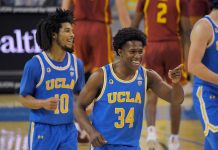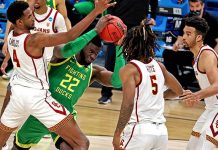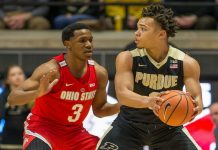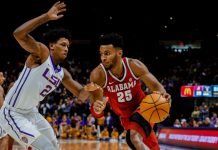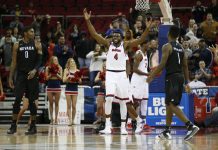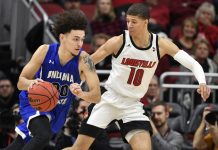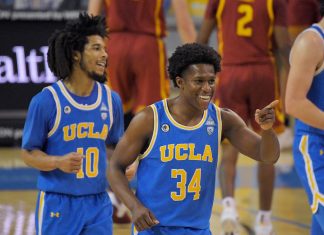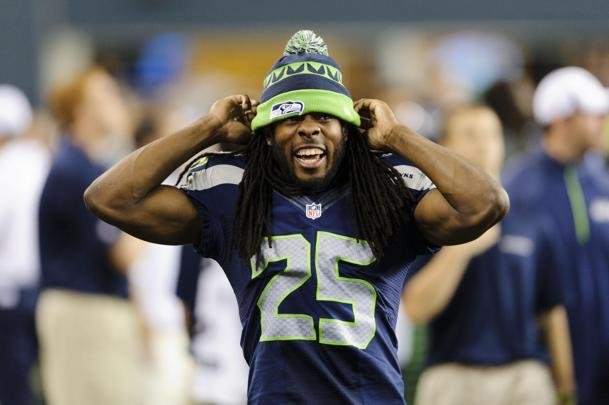SYRACUSE, N.Y. (AP) Syracuse coach Jim Boeheim admitted that the beginning of his 42nd year as head coach at his alma mater feels a little different, and it has nothing to do with his age.
Longtime assistant Mike Hopkins is no longer there to lean on. After 22 years on the bench alongside his mentor, Hopkins jumped at the chance to become head coach at Washington in March, passing up the opportunity to take over for Boeheim as planned.
And so the beat goes on.
”It’s the same every year. You want to have a great team,” Boeheim, who turns 73 in November, said Friday at the team’s media day inside Carmelo K. Anthony Basketball Center. ”There’s nothing different, whether it’s your first year, your 10th year, 15th, doesn’t matter. You want to go out and you want to get this team to be as good as they can be.
”There’s no carryover. That’s why you have the same focus every year. As long as I feel that way, I’ll try to coach.”
Last season began with the Orange ranked in The AP Top 25 and ended with an 85-80 loss at home to Ole Miss in the second round of the NIT. Syracuse was the top seed, which likely meant just one more victory during the season would have landed the Orange in the NCAA Tournament. Instead, the Orange finished 19-15, the most losses in a season for Boeheim, and 10-8 in the Atlantic Coast Conference.
There’s no mention in the preseason this year of the Orange being ranked. Time will tell.
Syracuse lost two key performers in fifth-year transfers Andrew White, the team’s top scorer (18.5), and point guard John Gillon, as well as forward Tyler Roberson and center Dajuan Coleman, who played in only 17 games in the final year of his injury-plagued career.
The biggest loss came after the season, when star forward Tyler Lydon, who was recruited by Hopkins and was very close to him, left for the NBA. Lydon averaged 13.2 points and a team-best 8.6 rebounds as a sophomore and shot 40 percent from 3-point range during his Syracuse career.
Then Taurean Thompson, a 6-foot-9 forward from New York City who played in all 34 of the Orange’s games in 2016-17 with 21 starts, left the program to return to the metropolitan New York City area to be closer to his family. He’s transferred to Seton Hall after averaging 9.2 points and 3.8 rebounds and shooting 54.6 percent from the field, often showing a deft touch around the basket.
Sophomore guard Tyus Battle is the only starter back from last year’s team. Also back are junior guard Frank Howard, 7-2 junior center Paschal Chukwu, and 6-8 redshirt freshman forward Matthew Moyer.
Battle, who made 60 3-pointers and averaged just over 11 points as a freshman, is ready to assume the role of leader.
”I’ve always led by example,” Battle said. ”We lost a lot of guys, we have a lot of young guys this year. I think we jell really well as a team. We’re definitely going to surprise a lot of people. I think it’s going to be a fun year.”
Practice began in late September and the Orange welcomed another graduate transfer, guard Geno Thorpe, who led South Florida in scoring a season ago. Another transfer, sophomore guard Elijah Hughes, will have to sit one year after coming to Syracuse from from East Carolina. Hughes can practice this season and will have three years of eligibility left.
The freshman class features: 6-8 forward Oshae Brissett and guard Howard Washington, both from Athlete Institute Prep in Ontario, Canada; 6-9 forward Marek Dolezaj of Slovakia; and 6-10 forward Bourama Sidibe from St. Benedict’s Prep.
Boeheim said both Howard and Brissett have worked ”extremely hard” and are getting better.
”Obviously, they need to get in games, see how they adjust in those situations, before you know what they’re going to be,” Boeheim said.
Syracuse averaged 76.3 points last season and relied on its perimeter game – the Orange hit 300 3-pointers and shot 38.1 percent – but that strategy cost the Orange when their shooters went cold.
”We were a very good 3-point shooting team last year. This year’s team we may not be able to shoot as many 3s and be as effective from the 3-point line,” Boeheim said. ”We’ll have to adjust and find some other way to attack.
”Our big guys have to be healthy. That’s important,” he said. ”We’re a little bigger and have a little bit more potential to be a better defensive team than we were last year. We won’t be as good an offensive team.”
—
For more AP college basketball coverage: http://collegebasketball.ap.org and http://twitter.com/AP-Top25
25% Bonus via Western Union


